

|
Soundclips: Melody Statement:
| Robben Ford's Guitar Solo:
|
| See Steve's Hand-Written Solo
Transcription |
|
Robben Ford's guitar solo on: "Sophisticated Lady"(Duke Ellington) When the algorithms of YouTube somehow pointed me at guitarist Robben Ford playing Duke Ellington's classic ballad, "Sophisticated Lady" with the Frankfurt Radio Big Band, I was really looking forward to listening to just how Robben would play this kind of very expressive ballad, one that is filled with a set of complex chord changes to negotiate. 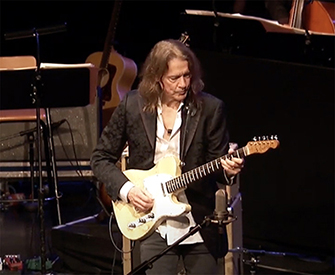 Throughout his long and distinguished career, Robben Ford has been a guitarist, musician, singer who is not so easy to plug into one fixed category. To me, fundamentally, he is one of our great electric blues players! That is a given. But, he's so much more than that. Could one say that he's a sophisticated blues player, or a Jazzy blues player? I suppose so....but, you would also have to include some of his forays into the world of Jazz/Rock Fusion, where his playing can be heard alongside some of the greatest voices in Jazz. For me, I choose to just leave the categorizing of what Robben Ford is as a player to others. What I know is that he is simply a great, great player, one who can be called upon to play just about anything - and he will always sound musical and present. Throughout his long and distinguished career, Robben Ford has been a guitarist, musician, singer who is not so easy to plug into one fixed category. To me, fundamentally, he is one of our great electric blues players! That is a given. But, he's so much more than that. Could one say that he's a sophisticated blues player, or a Jazzy blues player? I suppose so....but, you would also have to include some of his forays into the world of Jazz/Rock Fusion, where his playing can be heard alongside some of the greatest voices in Jazz. For me, I choose to just leave the categorizing of what Robben Ford is as a player to others. What I know is that he is simply a great, great player, one who can be called upon to play just about anything - and he will always sound musical and present.This particular performance actually took place in Germany on March 14th, 2015, but was only released to the public via YouTube during March of 2021, some 6 years later. The gorgeous and very creative arrangement was penned by the once bass trombonist/tubist, Ed Partyka, who moved to Germany in 1990 and has been a valued contributor to various artistic projects with the Frankfurt Radio Big Band. In 2018, he was appointed artistic director and chief conductor of Finland's UMO Helsinki Jazz Orchestra. More recently, he has been a Professor for Jazz Theory & Composition and department chairman of the Jazz Institute at the University of Music and Performing Arts in Graz, Austria. I think that you only have to listen to his treatment of "Sophisticated Lady" for Robben Ford to appreciate the depth of Ed's arranging skills, and his sense of moderation and good taste. He has filled an oft-recorded song with lush harmonic colors and textures as he blends brass with saxophones and woodwinds. When we arrive at the more formal analysis section of Robben's actual solo, I will present some of the finer points within Ed Partyka's arrangement behind the solo. Through the good graces of the great tenor saxophonist Paul Heller (WDR Big Band - Köln), I was able to connect with Ed Partyka via e-mail as I sought to try to learn if there was a singular interpretation of "Sophisticated Lady" that had informed Robben Ford's desire to play and record it that year. Ed was so very gracious and shared with me a most surprising story that Robben was actually inspired by the version 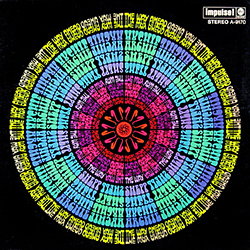 by one of our great artists, tenor saxophonist Archie Shepp from his 1968 album, "THE WAY AHEAD" a spectacular performance that featured: Walter Davis, Jr. (Ac. Piano); Ron Carter (Ac. Bass) and Roy Haynes (Drums). by one of our great artists, tenor saxophonist Archie Shepp from his 1968 album, "THE WAY AHEAD" a spectacular performance that featured: Walter Davis, Jr. (Ac. Piano); Ron Carter (Ac. Bass) and Roy Haynes (Drums).You see, when the Coltrane/Shepp album "NEW THING AT NEWPORT" came out in 1965, I had the LP, and of course I instantly became a fan of Shepp's playing and writing. Not so long ago, I was thinking about recording his "Call Me By My Rightful Name" and when transcribing it - I heard a lot of Ellington & Strayhorn there within the implied chord changes. As a teenager back in 1965, I had actually memorized the words to his poem "Skag"......which I still can recite to this day!!! I feel that it is one of the most important pieces of music ever recorded. In 1986, when I toured with Zawinul as part of Weather Update, our first concert was scheduled in Vienna, where we rehearsed, and Archie Shepp was staying in the same hotel. Zawinul introduced to the two of us and, in what became the thrill of a lifetime for me, I actually sat and had breakfast with Shepp (as Zawi called him), and it was a remarkable experience. Like so many musicians of that period - in his way, Shepp was truly a voice of the black experience in America - needless to say, a tortured and painful one. Archie Shepp is a giant, as a musician and as a human being. I am now adding in to this piece a wonderful INTERVIEW from November 30th, 1985 that Ben Sidran, the resident philosopher of Jazz and Jazz history, did with Archie Shepp as part of his "TALKING JAZZ" Series. For those of you seeking to gain an insight into this visionary musician and socio-political activist, hearing him speak should serve as a great point of entry. I had originally called on my good friend electric bass legend Jimmy Haslip to try to learn just what had inspired Robben to want to interpret "Sophisticated Lady." Jimmy, who has a long and storied history with Robben going back to albums like "THE INSIDE STORY"(1979) and the very first "YELLOWJACKETS"(1981) album, and continuing right to the present with their "JING CHI"(2002-17) collaborations. As you have just read, lucky for me, I was able to be in contact with arranger Ed Partyka, who supplied me with some key information. However, when Jimmy reached Robben and spoke with him from his new home in London, Robben generously asked if he could write a little something about the genesis of all of this - and now, here we are. Robben Ford was kind enough to send me his reflections on this song and the performance: "I discovered the great musician/saxophonist, Archie Shepp while still in my teens, buying any record with a saxophone on the cover, to learn about jazz. The first record of his that I stumbled upon was "The Way Ahead" on the Impulse label. It was challenging on every level, but I loved it. And a stand out performance for me was his version of Duke Ellington's "Sophisticated Lady." I believe that it's Roy Haynes on drums and I'm sure it's Ron Carter on bass. The way Archie took a standard to such emotional extremes was a revelation. He put, for me, B.B. King, Jimi Hendrix and the entire history of jazz into a stunning improvisation. I was invited to work with Ed Partyka and the HR Big Band in Frankfurt, with Ed doing arrangements on my music He asked if I might like to include a standard.... something by Duke Ellington or something like that, and I thought of Archie Shepp's version of "Sophisticated Lady." Ed found a way to get similar tension from the orchestra... lot of dissonance... and just let me do my thing. It really worked well, and I'm so glad that Ed suggested it. It was a rare treat to play music like that with such a great band and within such a powerful arrangement." - Robben Ford, April 8th, 2024 Before my conversation with Ed Partyka, my own favorite vocal version of Ellington's "Sophisticated Lady" was by the sublime, Nancy Wilson. Then, of course, there are other interpretations by: Ella Fitzgerald; Lou Rawls; Julie London; Sarah Vaughan and Tony Bennett. From the purely Jazz instrumental side, I have always loved the interpretations by: Thelonious Monk; Donald Byrd featuring Pepper Adams (Bari Sax) w/ Herbie Hancock; Kenny Burrell and Art Tatum to name a few. Though improvising, soloing to many, is important - and for most people, reading what I write here @ KHAN'S KORNER, what remains as most important is how a melody, any melody is stated and played with love and care - and that includes the beautiful pillow of harmony that sets the jewel of the melody. Ed Partyka's arrangement does just that. In this spirit, I have also supplied above a soundclip of Robben Ford stating the melody for "Sophisticated Lady" - so that you can hear it for yourself. One of the things that I love so much about this arrangement is that, for the [I]ntro, Ed sets the mood by taking the chords that he used, for example in bar 4 of [A2] and assigning these rich sonorities to the brass & woodwinds as these tritone subs descend from D7#9-Db7#9-C7#9-B7#9 before landing on Bb7#9. 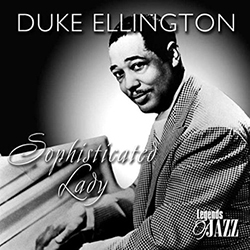 From there, we have Bbm7(9) to Eb7#5, and finally from Cm7(9) to F7(13) just before Robben's pick-up, which employs one his favorite devices using elements of the diminished scale, here F 1/2-tone/whole tone diminished [F, Gb, Ab, A, B, C, Db, Eb]. Generally speaking, if you don't have a simple lead sheet for the song itself, it often appears in most versions of "THE REAL BOOK." From there, we have Bbm7(9) to Eb7#5, and finally from Cm7(9) to F7(13) just before Robben's pick-up, which employs one his favorite devices using elements of the diminished scale, here F 1/2-tone/whole tone diminished [F, Gb, Ab, A, B, C, Db, Eb]. Generally speaking, if you don't have a simple lead sheet for the song itself, it often appears in most versions of "THE REAL BOOK."The performance of this ballad is fundamentally played at a slow tempo of Q=66 but phrased with a kind of elasticity and then gently propelled by the rhythm section of: Thomas Heidepriem (Ac. Bass) and the brushes of Paul Höchstädter (Drums) who do not actually enter until beat 2 of the 1st bar of [A2] and the beauty of acoustic bass and brushes allows the depth of this arrangement to shine through as it supports Robben's loving treatment of this great old melody. Robben's statement is loose and filled with personal touches including a hint of his own blues-oriented mannerisms during [A3]. When the solo actually begins, Thomas and Paul gracefully shift into a ballad double-time feel where you might not even notice this shift and that is the artfulness of this kind of playing. As always, for me, and especially with a ballad, I have to wrestle with just how I'm going to choose to notate everything. Because the tempo is so slow, if you look at the transcription, written in 4/4 and with 16th notes, it can appear as if Robben Ford is playing a million notes - when, in truth, he's really not. Had I chosen to write out the solo in cut-time, it would have ended-up being twice as long and more spread out. I'm going to hope that this explains the choice that I made and why the written version appears as it does. Also, because it is a ballad, the concept of playing such an expressive song, one's personal phrasing, especially being in the moment, metronomic precision is really not of great importance. And, like any great abstract painting, like the melting clock of Dalí, the phrasing should stretch the bounds of what is within the bar line or not. In trying to notate what was played, of course, I wanted to capture the notes, the pitches, as they were, but not be bound by trying to make things 100% rhythmically accurate. So, if what you see, does not completely agree with what you're hearing, these choices might be the reason. For those non-guitarists out there, I would want to remind you all that the guitar is a transposing instrument and is written one octave above where it actually sounds. So, if some passages seem to be stratospheric, it is really not the case at all. Please do keep this in mind. With this now stated, let's take a journey together through Robben's wonderful solo. Back when I was just a mere music student at U.C.L.A., beginning in 1965, I found myself in great trouble because my piano skills had long since eroded after having played from the ages of 5-12. I felt as though I would never be able to catch-up enough to even pass my "beginning" harmony & theory classes. So, upon the advice of my dear friend, Dan Keller, I went to study piano with an elderly woman named Victoria Front, who spoke with a very thick German accent - but, she was fantastic and, in the end, she saved my musical life. I would have never, ever attained even my B.A. without her wisdom and help. One of the great lessons that she imparted to me as I was attempted to play some very rudimentary classical piece was that, while critiquing my playing, she said to me: "Steve, you must understand the will of the tone - the notes are not just there to be there, they have a purpose, and each note is headed somewhere!" 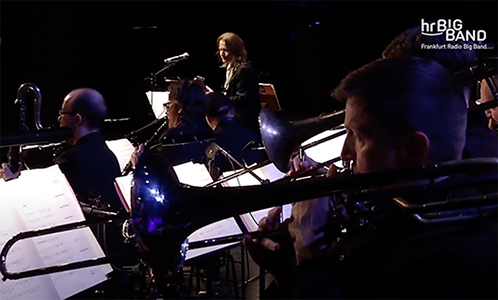 This has stayed with me my entire life and especially when improvising/soloing or listening to others play - the best moments often occur when one surrenders to the notes one is playing and allows them to lead us where they will. I say this to everyone now because, during his solo, Robben Ford is doing exactly this - the notes, at times, just seem to transport him, and make their journey his journey. When playing, this can be a most intuitive and spiritual journey. Perhaps, as you listen and read what I am about to share with you - keep this in mind. This has stayed with me my entire life and especially when improvising/soloing or listening to others play - the best moments often occur when one surrenders to the notes one is playing and allows them to lead us where they will. I say this to everyone now because, during his solo, Robben Ford is doing exactly this - the notes, at times, just seem to transport him, and make their journey his journey. When playing, this can be a most intuitive and spiritual journey. Perhaps, as you listen and read what I am about to share with you - keep this in mind.I should note that Robben plays this entire concert using his Fender Telecaster, and on this tune there are no fancy gadgets employed just the natural tone of the guitar with perhaps a touch of tasteful reverb. Robben's solo begins with a pick-up into, what I have chosen to label as, letter [A] by using a paraphrase of Ellington's melody. This kind of device is always welcomed and serves to connect the soloing to the melody that has just come before. Even though within Ed Partyka's arrangement the chord in bar 1 Bbm(maj7), Robben is, in a sense, ignoring it and his descending line is derived from Bb Dorian [Bb, C, D, Eb, F, G, Ab] beginning with Eb on top. Had he used an A-natural, he would have been playing Bb melodic minor. In bar 2, we have one of the composition's passages of descending dominant 7th chords: Gb7-F7-E7-Eb7, and in this first appearance, Robben actually observes all of the chords. In the history of Jazz, there are many approaches to such moments where there is a chord per beat, because observing each chord can make the player a prisoner of the tune. So sometimes you will hear players taking the long view, and hearing through the changes, because the end goal is that you are going to be resolving to Abmaj7 in bar 3. There are any number of ways to insert chords that are not really there via your lines to make the lines flow more. With that resolution in bar 3, even though the chord within the arrangement is Abmaj7#4, Robben does not employ the Lydian mode, which would give us a D-natural. Instead, his very rhythmically thematic line presents all of the color tones: maj7th, 6th and the 9th. Over the next group of descending dominant 7th chords: Ab7-G7-Gb7-F7 as we head towards a Bb7 chord, Robben alludes to the blues which is, of course, hugely important to his style, but also gives the soloing an earthiness that a more 'pure' Jazz players might not use at all - which I often find to be unfortunate. Over the Bb7 chord (II7 in this key) in bar 5, Robben plays a bluesy phrase alluding to our I chord (Abmaj7), this too adds soul to the solo. Yes, the blues is right there within a major 7th chord. But on beats 3-4 of that same bar, as he is headed towards Bbm7, here you could view this line as one of a couple of things: [1] He could be using Bb melodic minor [Bb, C, Db, Eb, F, G, A], but I choose to see the appearance of those A-naturals as neighboring tones more than a modal approach. The line itself comes from the greater Jazz vocabulary tradition. In bar 6, over the ii-V (Bbm7-Eb7), once again Robben is putting to use the diminished scale, in this case Eb 1/2-tone/whole diminished: [Eb, E, Gb, G, A, Bb, C, Db]. As the line is ascending I wrote it out using F# instead of Gb - so try not to let that confuse you. When he descends from the high Eb, on beat 1 of bar 7, even though the chord in the arrangement is Cm7(9), I hear Robben playing F Dorian [F, G, Ab, Bb, C, D, Eb] descending from C-natural. Notice that there is neither a D-natural or a Db in the line. Over the F7(alt.) chord in bar 8, another bluesy mannerism appears barely touching upon the 3rd and then, thematically, he uses the same idea, but now playing the b9 (Gb) and the 7th (Eb). As we arrive at [A2], in bar 1, Robben is again ignoring the Bbm(maj7) sonority and playing within Bb Dorian. In bar 2, with the descending dominant 7th chords, this time Ed Partyka's arrangement employs all b5 subs so that this we have C7(13)-B7(13)-Bb7(13)-A7(13) to arrive at Abmaj7#4 in bar 3. This time Robben takes a more minimalist approach and really leaves space until playing over the Imaj chord, this time with a more pronounced bluesiness as you hear him using the b7(Gb) and the blue note of the m3rd(Cb). He vaults through an Eb major arpeggio on his way to bar 4 which reveals a 2nd set of b5 subs, this time we have D7#9-Db7#9-C7#9-B7#9 with each chord placed on the upbeats. As he did in bar 2, Robben chooses to leave space and allow the chords to pass. Once again, in bar 6, over the Bb7 chord, Robben returns to the blues over the I7 chord. It is a very nice touch. In bar 6, over the Bbm7-Eb7 chords, he uses a very traditional Jazz phrasing device within the mode but with chromaticism: 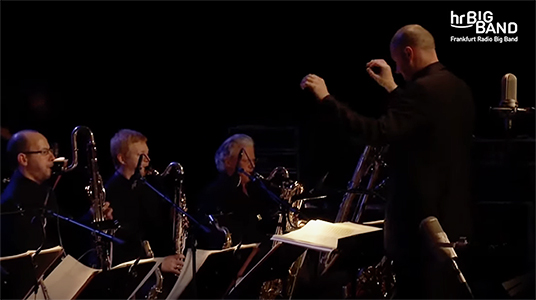 Eb-D-Db-Eb leads to a Jazz phrasing mannerism with a quick little triplet figure. In bar 7, as we resolve to Abmaj7#4, Robben plays a sequential ascending line which takes him all the way to the tippy-top of the guitar register and a high C-natural - a note that he plays at a whisper. He then allows the Am7b5 to D7(alt.) to pass by while simply taking a breath - always a great thing to do! Eb-D-Db-Eb leads to a Jazz phrasing mannerism with a quick little triplet figure. In bar 7, as we resolve to Abmaj7#4, Robben plays a sequential ascending line which takes him all the way to the tippy-top of the guitar register and a high C-natural - a note that he plays at a whisper. He then allows the Am7b5 to D7(alt.) to pass by while simply taking a breath - always a great thing to do!In letter [B], Ellington's changes become much more traditional with basically 4 bars each of I-vi-ii-V [Gmaj-Em7-Am7-D7]. Don't be fooled by the seeming simplicity of these chord changes as there always exists a great opportunity for linear creativity, and Robben does just that. The opening phrases present his knowledge and comfort level with Jazz phrasing configurations, especially the graceful usage of neighboring tones. For example, in the pick-up to the 1st bar, the target note is D-natural, but he surrounds it with an upper consonant neighbor, E-natural, and then the chromatic lower neighbor of C# which is a very typical Jazz player's way of doing things. Then in the capacity to use all of the guitar's colors, Robben plays a harmonic splash via the natural harmonics at the 7th fret which gives us the wonderful color tones: maj7th(F#)-9th(A-natural) and 6th(E-natural). His configuration of the notes on beats 3-4 of that bar are very much in the Jazzier side of things. In bar 2, over the Am7-D7(alt.), he begins by using repeating notes on the D-natural, and then using altered and color tones including the b9(Eb) and 13th(B-natural) to give a diminished sense of things. You could say that all of these notes are from the D 1/2-tone/whole-tone diminished scale [D, Eb, F, F#, Ab, A, B, C]. In bar 3, instead reusing Gmaj7, Partyka subs in Bm7, a very common device - but always effective. Robben stays very diatonic through the first 2 beats, but then, over the E7#9 sonority, he puts to use just about all of the altered tones: F-natural(b9)-G-natural(#9)-Bb(b5) plus C#(13th) - all ascending to his playing the blues in G over the Am7 chord in bar 5. A lifetime of experience as a master blues player prepares you for moments like that. To return to the Imaj7 chord in bar 5, at the end of bar 4, over the D7b9, he plays a classic V-I Jazz line over such a chord going from #9(F)-b9(Eb)-R(D)-7th(C) to resolve on B-natural, the 3rd of Gmaj7. Through bars 5-6, his playing is all diatonic, you could say that they are all notes are derived from the G major scale or Ionian Mode [G, A, B, C, D, E, F#]. In bar 7, Jazz phrasing comes into play again with the very characteristic gliss, using pull-offs, down from his high G-natural to Eb - and as the Cm7 arrives on beat 3, I suppose that you could say that Robben is using C minor pentatonic [C, Eb, F, G, Bb] with the addition of D-natural. With the insertion of the nice chord change of Db7(13) on beat 1 of bar 8, Robben uses the arpeggio: Db-F-Ab-Cb-Eb-Db. On beats 3 & 4, Partyka gives us C7b5 to B7(9b5) - and Robben just 'hears' his way through them. Within the classic A-A-B-A format, the arrival of [A3] signals that this wonderful solo is winding down. In bar 1 of the section, over the Bbm(maj7) sonority, Robben plays a long descending line filled with essential minor-oriented Jazz phrasing configurations, especially in the middle of beat 2, where you hear C-Bb-A-F-Ab-F-G, etc.! 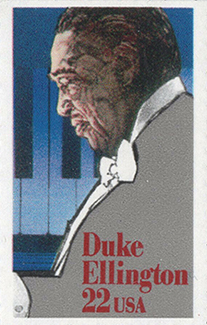 Fundamentally, all of the notes that he plays are really from Bb Dorian - that A-natural was really just a chromatic passing tone between Bb and Ab. As this line tails off, Robben actually plays his low open E-string. This means that, over the course of this solo, he has covered the ENTIRE range of the guitar - with that low open E-string, and the prior appearance of that high C-natural 2 frets away from using the highest note on the instrument - D-natural. In bar 2, over the descending progression of dominant 7th chords [NOTE: I remain a bit confused because after multiple listens, I hear the acoustic bass playing a G-natural on beat 1], this time Robben does what I had suggested as being possible, he simply plays through all of the chord changes by using only the last chord, the V7(alt.) chord of Eb7, and he uses tones from the Eb altered dominant scale [Eb, E, F, G, A, B, C, Db]. The small addition of the Eb augmented triad is yet another nod to traditional Jazz vocabulary. In bar 3, over the Abmaj7 chord, the line is yet another very standard Jazz type of line over a major7 chord with the highlight note being Bb at the top of the run. In bar 4, over the descending 7#9 sounds, I love how he just plays a couple of bluesy notes: Ab, Cb, Db - right out of the Ab blues scale [Ab, Cb, (C-natural), Db, E-natural, Eb, Gb]. It sounds to me like he picked those notes very close to the tailpiece of the guitar in order to get that twangy kind of sound à la Duane Eddy. From there, on the last beat of bar 4 you have F7#9, and here Robben uses a simple F7 arpeggio to get him to the Bb7(13) chord in bar 5. But over this chordal sound, again, it is the II7 of the greater 'key' of Ab, I now feel that Robben was playing the blues in the area of the b5 sub E7, and I have spelled these notes to reflect that harmonic relationship. For me, to my ears, this kind of approach hits very close to home! This kind linear thinking continues through the 1st 2 beats of bar 6, but on beat 3, when the true V7 chord arrives, Eb7(#9b5), notes from the Eb altered dominant scale, which some might consider to be F melodic minor [F, G, Ab, Bb, C, D, E] as the notes are the same, these tones pull us towards resolution on the Abmaj7(#11). Notice that, on the last beat of bar 6, Robben is already in the area of the Ab blues language. As the solo comes to its conclusion, over the Am7b5, Robben spells out the principle arpeggio for capturing that sound, meaning a Cm triad (G-C-Eb), and finally a very melodic resolution to Gmaj7 and, within Ed Partyka's arrangement, a reprise of our Letter [B] with only the orchestra, giving Robben Ford a chance to take a breather - a much deserved breather at that! Fundamentally, all of the notes that he plays are really from Bb Dorian - that A-natural was really just a chromatic passing tone between Bb and Ab. As this line tails off, Robben actually plays his low open E-string. This means that, over the course of this solo, he has covered the ENTIRE range of the guitar - with that low open E-string, and the prior appearance of that high C-natural 2 frets away from using the highest note on the instrument - D-natural. In bar 2, over the descending progression of dominant 7th chords [NOTE: I remain a bit confused because after multiple listens, I hear the acoustic bass playing a G-natural on beat 1], this time Robben does what I had suggested as being possible, he simply plays through all of the chord changes by using only the last chord, the V7(alt.) chord of Eb7, and he uses tones from the Eb altered dominant scale [Eb, E, F, G, A, B, C, Db]. The small addition of the Eb augmented triad is yet another nod to traditional Jazz vocabulary. In bar 3, over the Abmaj7 chord, the line is yet another very standard Jazz type of line over a major7 chord with the highlight note being Bb at the top of the run. In bar 4, over the descending 7#9 sounds, I love how he just plays a couple of bluesy notes: Ab, Cb, Db - right out of the Ab blues scale [Ab, Cb, (C-natural), Db, E-natural, Eb, Gb]. It sounds to me like he picked those notes very close to the tailpiece of the guitar in order to get that twangy kind of sound à la Duane Eddy. From there, on the last beat of bar 4 you have F7#9, and here Robben uses a simple F7 arpeggio to get him to the Bb7(13) chord in bar 5. But over this chordal sound, again, it is the II7 of the greater 'key' of Ab, I now feel that Robben was playing the blues in the area of the b5 sub E7, and I have spelled these notes to reflect that harmonic relationship. For me, to my ears, this kind of approach hits very close to home! This kind linear thinking continues through the 1st 2 beats of bar 6, but on beat 3, when the true V7 chord arrives, Eb7(#9b5), notes from the Eb altered dominant scale, which some might consider to be F melodic minor [F, G, Ab, Bb, C, D, E] as the notes are the same, these tones pull us towards resolution on the Abmaj7(#11). Notice that, on the last beat of bar 6, Robben is already in the area of the Ab blues language. As the solo comes to its conclusion, over the Am7b5, Robben spells out the principle arpeggio for capturing that sound, meaning a Cm triad (G-C-Eb), and finally a very melodic resolution to Gmaj7 and, within Ed Partyka's arrangement, a reprise of our Letter [B] with only the orchestra, giving Robben Ford a chance to take a breather - a much deserved breather at that!Over the years, I have, on rare occasions, run into Robben in the course of touring here and there and we have always been friendly and cordial with one another, but we are not friends by any stretch of the imagination - just colleagues. For me, with years of private teaching behind me, I would have to say that many, many students who have passed through the door here were huge Robben Ford fans and so, one is forced to try to answer questions about Robben's playing. So, I do feel somewhat familiar with his work. When I first heard this particular "Sophisticated Lady" presentation via video, I immediately enjoyed it on any number of levels - especially the love and care that Robben demonstrated when stating the melody. 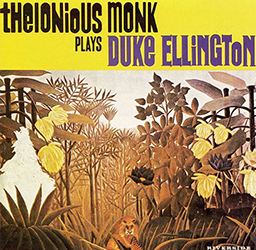 This is always of great importance for me. I enjoyed his soloing too but, as it always is with ballads and blues-oriented playing - doing a transcription signals a LOT of work, and never being fully satisfied with how I have chosen to notate what was played. But, that stuff aside, I decided to go ahead and do it anyway. The rewards of trying to explore the story of just how Robben came to record this particular tune have been most rewarding, especially striking-up a correspondence with arranger Ed Partryka. I'm going to be ever hopeful that the few people who take the time to explore what has been presented here and to listen and listen carefully - your time will have been well spent. Just for fun, I decided to also present the cover image of Thelonious Monk's album "THELONIOUS MONK PLAYS DUKE ELLINGTON" from 1955, which is a famous painting by Henri Rousseau. A cover like this was a great rarity for a small Jazz label like Riverside Records. This is always of great importance for me. I enjoyed his soloing too but, as it always is with ballads and blues-oriented playing - doing a transcription signals a LOT of work, and never being fully satisfied with how I have chosen to notate what was played. But, that stuff aside, I decided to go ahead and do it anyway. The rewards of trying to explore the story of just how Robben came to record this particular tune have been most rewarding, especially striking-up a correspondence with arranger Ed Partryka. I'm going to be ever hopeful that the few people who take the time to explore what has been presented here and to listen and listen carefully - your time will have been well spent. Just for fun, I decided to also present the cover image of Thelonious Monk's album "THELONIOUS MONK PLAYS DUKE ELLINGTON" from 1955, which is a famous painting by Henri Rousseau. A cover like this was a great rarity for a small Jazz label like Riverside Records.On a brief historical note, I was trying to remember just when I first heard and met Robben Ford, and I had to go deep into my collection of Datebooks, because I remembered meeting him in Boston during the mid-'70s. My guess was pretty much correct. At that time, we were doing our first 'live' gigs as the Brecker Bros. Band which then included, in addition to Mike & Randy: David Sanborn; Don Grolnick; Buzzy Feiten [Yes, the two of us were playing together a lot back then!]; Will Lee; and Chris Parker. On the weekend of May 2nd-4th, 1975, we were playing at the Jazz Workshop in Boston, and opposite us, playing in Paul's Mall was Tom Scott and the L.A. Express [w/ Larry Nash; Max Bennett and John Guerin]. The band also featured a very young Robben Ford on guitar. I believe this was not so long after all the incredible press Robben had received after doing some touring with George Harrison. I remember that Tom's band packed the club, which was considerably larger than the Workshop, and I don't believe that we did quite as well. My recollections, upon hearing Robben, were that he really sounded great, but after each phrase, he seemed to just slide down the strings with his left-hand. I think that this mannerism has long since disappeared. I also remember that he and his then girlfriend were draped all over each other, and it was a bit hard to really have a conversation with him. Perhaps this was because he was traveling in very different and unfamiliar musical company? I don't know. I remember that she seemed to be a typically lovely looking Northern California type of girl, with flowing velvet dresses, capes, and other accoutrements aligned with those waning "Hippie" years. It's hard to believe that all this took place nearly 50 years ago! Once again via the magic of YouTube, for those of you who have been yearning to hear Robben Ford playing with his wonderful sound from, perhaps, other times - apparently, he is preparing a book - one that would seem to include some performance tracks, and who knows what else? So, here is a direct link to one such Robben Ford performance track which seems to be a blues in Gb. The song is apparently titled, "What I Haven't Done." Hoping that, if you have found this, you will be enjoying it. All the best to one and all, BIG LOVE from New York - Steve
[Photos of: Robben Ford extracted from the Frankfurt Radio Big Band video for "Sophisticated Lady" on March 15th, 2015
Ed Partyko conducting the Frankfurt Radio Big Band] |